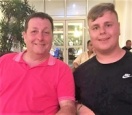Why is research important? It can give so much more than just the steps towards improved treatment and management!
As research manager at Tourettes Action I’ve always focused on the results of the research as being the long term gain we get from conducting research. Speaking to this Dad and son changed my views of this – having the parent and young person’s perspective has been so useful.
It’s not just about those long term research results from data that can impact people’s lives. Of course the research results are important, but when dealing with a complex condition such as Tourettes Syndrome (TS) we may have to look further into the future before there are great steps forward in terms of treatment and management. Speaking with Neil and Ben Parfitt has given me insight into the fact that that just by being involved in research it has the potential to send an important positive message to children and young people with TS. There is going to be an answer someday, somewhere, but right now we need to raise our hopes and as potential research participants the adults and young people with Tourettes Syndrome are important and can help themselves as well as helping others when involved in research.
Dad – Neil
 |
What would your advice be to other parents thinking about involving their children in research, but who feel unsure?
‘By involving your child in research you give them a feeling of self-importance and that they are contributing something by giving something to other children with TS’. By children with TS and their parents accepting their TS and by trying research they are showing there IS going to be an answer’.
|
Neil was so positive about his and Ben’s experience of research that I understood that Neil was putting forward the point that the impact on the research participant can be great, perhaps greater even than just the feel-good factor of knowing you were in some way ‘helping others’. The benefits of being involved even though might not be directly related to improving the research participant’s symptoms but in terms of the overall outlook and positivity being involved in research imparts. Neil suggested that ‘when the parents sign their children up for research this shows optimism and hope for the future which rubs off on the child’.
Neil described the day-to-day struggles of having a child with TS and the loss and guilt that some parents might feel in regards to their child’s difficulties ‘children with TS often have led a ‘normal’ life before TS came along, they know what a normal life is like, which can make the loss of it feel big. TS can limit social life and school and could mean they are less likely to succeed’. He acknowledged the common worry about whether the tics will be with their child for the rest of their lives indicating a change in perspective can be helpful ‘children with TS often live in the short-term, they look to and worry about tomorrow. Parents of children with TS can look further afield to the future and they need to raise the hopes of their children, they need to hope that tics will subside but this doesn’t mean that the short-term can’t be happy’.
I asked him if he had any concerns about what the research might be like for his son. He said of course there was some anxiety but this soon disappeared and ‘any parents’ anxiety about involving their children in research is far outweighed by the benefits’. He went on to say that ‘you may have some worries but you put yourself in the hands of the professionals’.
Neil described the change in Ben and that being involved in research ‘opened Ben’s eyes’. He described Ben after the research as having gained confidence and coping better with peer pressure. He said before the research Ben was very conscious of his tics, but now it doesn’t seem to matter so much. I was so happy to hear Neil describe that one of the effects of being involved in the research was that Ben conquered his tics and this helps Ben to cope with the stigma. Ben’s dad described that the hardest thing is getting the people around Ben to understand what TS is. Neil is full of praise for Ben and says he copes better now and has ‘hit it head on’.
Boxing/sport
Ben loves sport and in particular boxing but Dad described his anxiety when watching Ben before a competitive fight, it was ‘difficult to watch his tics get worse and worse before an event, to put him through that. I am so glad I didn’t stop him. When the coach gets inside his head and pumps him up and tells him how great he is, what he can achieve you see the tics reduce and his focus takes over. I don’t want to take that exhilaration away from him. I don’t want TS to beat him, I want him to beat TS and it has given him tremendous motivation’.
I was keen to hear from Ben about his experiences of research and how he was feeling about his TS.
Ben
Ben was involved in a research study about TCDS with Professor Stephen Jackson at the University of Nottingham. TCDS is Transcranial Direct Current Stimulation is a method of painless brain stimulation in which creates a magnetic field over the scalp. This causes circular electrical currents in the brain stimulating neurons and muscle activity. Patients are often given stimulation repeatedly for the treatment of movement disorders such as Tourette Syndrome.
|
|
‘I was diagnosed at 6 years old, I’m 18 now. I’ve got multiple motor and vocal tics all the time. When my Dad told me about the research I was chuffed and I thought it was brilliant as I had tried everything so far. I had a brain scan at the University of Nottingham and then the treatment of once a day for 20 minutes with the machine at home. It wasn’t painful but it did tingle a little, in a good way like you were being tickled. It took a couple of days for the treatment to kick in, just the way medication does. We went back to University of Nottingham and they made some adjustments and changed the settings and then there was a bigger difference and all my tics reduced. It was brilliant. At first I felt a little nausea and dizzy but very soon, after about 5 days it was gone. That was the only side effect, but they warned me this might happen’. |
‘I had a year of doing it (the research), I finished in May (2016) and now the tics have gone back to how they used to be. But since being involved in the research and instead of going to school in my last year I had home tuition and have an apprenticeship now. I feel much better now and once I had been involved in the research my attitude changed. I was out and about and went to the gym and didn’t let it stop me from living my life. The best bit about the research has been having the opportunity to offer my services and help other people, and other people should get on board too’.
I asked Ben what he might say to other people thinking about being involved in research, but who are unsure? ‘If you are thinking about being involved in research – don’t be afraid, don’t be anxious, think good thoughts, you don’t know until you try something what it’s going to be like – take action. If your family and close friends see you happy then it makes them happy too. If you get knocked down then get back up again, don’t doubt yourself, keep going. If I didn’t have TS, without it I wouldn’t be the person I am today – it’s made me a stronger person’.
Very many thanks to Ben and Neil for sharing their experiences and if you or your children are interested in being involved in research please join the Tourettes Action research participant registry. Sign up today and join the Research Participant Registry (a voluntary database of individuals willing to consider participating in research studies).
Research needs you!
Dr Seonaid Anderson
Research Manager Tourettes Action
Seonaid@tourettes-action.org.uk



